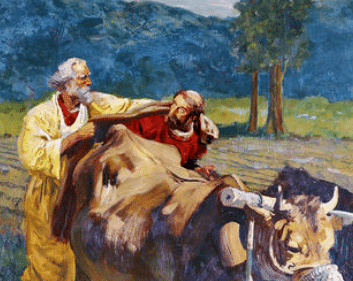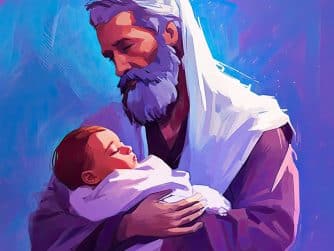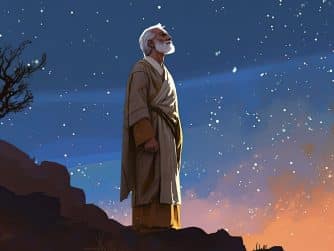To serve Christ to the fullest, we must forsake all. Because we’ve given our life to Him, we must take our hands off the steering wheel and give Him the driver seat. We must decrease and He must increase (Jn 3:30). This kind of statement doesn’t sit well with the ‘seeker sensitive’ crowd. It’s not just about praying a quick prayer, claiming your fire insurance and then off to the buffet to beat the ‘frozen chosen.’
It’s about making Jesus Savior and Lord, not just Savior. Many have made him Savior, but few have truly made him Lord.
Jesus should be Lord over every aspect of our lives and He desires the full territory of our soul. Don’t get me wrong, your salvation is assured if you’ve believed on the Lord Jesus Christ. This is a one-time decision. But honoring Christ’s Lordship means choosing to serve Him fully because we love Him dearly. Our motive for obedience is rooted in love for Him. We are to have no idols before Him. He will test our allegiance to Him in this regard. We are meant to be living sacrifices. Trouble is a living sacrifice has a tendency to crawl off the altar! To forsake, means, “to renounce or turn away from entirely.” My question to you is this, ‘have you forsaken all for Christ?’ ‘Have you renounced your former life and buried it once and for all?’ The bible has much to say about this.
Be prepared to lose your life
Jesus said, “For whoever would save his life will lose it. But whoever would lose his life for My sake and the gospel’s will save it. For what does it profit a man if he gains the whole world and loses his own soul?” (Mk 8:35–36). Notice a man may gain the world at the expense of his soul. In contrast, believers seek to lose their life for the sake of Christ, for the purpose of accomplishing what He desires through them. Is it possible to ‘lose’ one’s soul, in exchange for gaining power, prestige or wealth in this world? The Bible says it is possible.

Once a soul is fully exchanged, it’s lost forever. Many movie stars and musicians performing on the world stage have exchanged their soul for riches and adoration. Yet their success is brief and fleeting, soon to be long forgotten in the scope of eternity. They’ve chosen to glorify themselves, losing their souls in the process. The Bible commends us to ‘possess our soul with patience’ (Lk 21:19), not cast it off in exchange for worldly gain.
Abraham forsook all and was greatly blessed for it
Abraham is a prime of example of one who ‘forsook all.’ When God asked Abraham to sacrifice his son, Isaac he was potentially in danger of forfeiting the nation of Israel which God promised to establish through his progeny. ‘A great nation’ was something God already promised Abraham, but if he sacrificed Isaac, how would this come about? Of course, once God saw that Abraham was willing to do His will, even to his own detriment, Abraham passed the test.
God immediately provided an alternative sacrifice (ram) in the thicket (Gen 22:13). But God did not provide the alternative until he saw Abraham was willing to do what He asked. The point is, God tests us, to see if we’re willing to ‘lay it all on the line’ for Him. Because of His goodness, He offers us so much more in return.
Some of us will never see the full measure of God’s goodness if we’re not willing to do what He asks. We must be obedient to God, otherwise we might be in danger of forfeiting the destiny He has prepared for us.

There is no ‘Plan B’
When Elijah sought a successor, he found Elisha in the field, minding his own business, working his 9 to 5 job. Let’s read from the Book of 1st Kings:
“So, he departed from there and found Elisha the son of Shaphat, who was plowing with twelve yokes of oxen before him and he with the twelfth, and Elijah passed by him and threw his cloak on him. He left the oxen and ran after Elijah and said, “Please let me kiss my father and mother, and then I will follow you.” And he said to him, “Go back, for what have I done to you?” So, he returned from following him and took a yoke of oxen and sacrificed them and boiled their flesh with the yokes from the oxen and gave it to the people, and they ate. Then he got up and went after Elijah and ministered to him.”
– 1st Kings 19:19–21 (MEV)
When the Prophet of God threw his cloak on someone, he was symbolically offering the mantle of his prophetic office. Elijah was desirous for Elisha to be his successor. This was a great honor and I’m sure Elisha was thrilled at the opportunity. Yet Elisha hesitated momentarily, as I’m sure most of us would as his thoughts turned toward his family. Elisha’s priorities frustrated Elijah, as he proclaimed, ‘go back, I won’t stop you.’ Despite hesitation, Elisha made the right decision that day. One that would change the course of his destiny. Elisha immediately quit his 9 to 5 job, once he received the call to ministry. Plan B was no longer an option and he pursued Plan A for the rest of his days.

There’s a price to pay when it comes to serving God, something which Christ reiterated. Elisha had forsaken all and was willing to do God’s will. The fact that Elisha was working twelve yokes of oxen—twenty-four expensive animals—indicates that his family was probably better off financially than most Israelite’s and he must’ve had a considerable estate. It was no small thing for Elisha to leave his family and wealth behind.
Question is, would you be willing to do the same if God called you to the ministry or any other vocation for that matter? Have you made the decision to follow Christ regardless of the consequences? Or do you still have plan B in your back pocket, just in case things don’t work out?
When the road gets bumpy, you need to know the only path forward is with Christ, there is no turning back.

The One Hundredfold Blessing
Scripture states that Elisha was working the plough when Elijah laid his cloak on him. This ties in with something Jesus said, “No man, having put his hand to the plough, and looking back, is fit for the kingdom of God” (Lk 9:62). In essence, Christ was saying, once you join His kingdom, you can’t look back. You must have no regrets and press forward in what God has for you. If someone working a plough looks back, they will lose sight of what lies ahead and make a mess of their field! Let’s not forget that as we lay aside our personal ambition for Christ’s agenda, we will receive the one-hundred-fold blessing for doing so. Check out Mark’s gospel:
Jesus answered, “Truly I say to you, there is no one who has left a house or brothers or sisters or father or mother or wife or children or fields, for My sake and for the gospel’s sake, who shall not receive a hundred times as much now in this age, houses and brothers and sisters and mothers and children and fields, with persecution, and in the age to come, eternal life.”
– Mark 10:29-30 (MEV)
With God you simply cannot lose, whatever you give up for Him will be repaid one hundredfold, including whatever you need in this lifetime and in the life to come (heaven). We serve an awesome and faithful God! There’s no ‘loss’ with God; we gain eternal life and assurance all our earthly needs will be met.
Count the cost – Luke 14:24-36
Matthew chapter 10 and Luke chapter 14 provide our treatise on discipleship. Christ lays down the gauntlet and reminds His followers of the price which must be paid to be His disciple:
“Large crowds went with Him. And He turned and said to them, “If anyone comes to Me and does not hate his father and mother and wife and children and brothers and sisters, yes, and even his own life, he cannot be My disciple. And whoever does not bear his cross and follow Me cannot be My disciple.”
– Luke 14: 25-26 (MEV)

Our priority should be toward Christ and the Gospel, not family, career or anything else for that matter. We each have our own cross to bear on a daily basis, which is choosing the will of our Heavenly Father above our own. To be Christ’s disciple is to place Him above everything else, in all decision making. Bearing our cross does not mean taking on poverty, or sickness, which are curses of the law, which Christ died to annul. It means choosing God’s will over our own, on a continual basis.
Jesus will lay a firm foundation in you – To go high He must drill deep
“For who among you, intending to build a tower, does not sit down first and count the cost to see whether he has resources to complete it? Otherwise, perhaps, after he has laid the foundation and is not able to complete it, all who see it will begin to mock him, saying, ‘This man began to build and was not able to complete it.”
– Luke 14:27-30 (MEV)
We must have the temerity to see projects through to their very end. There are many good starters out there but not everyone knows how to finish well. Did you know the granite boulders in Central Park, New York are the remnants of the rock which was excavated from lower Manhattan to build the enormous skyscrapers that adorn the skyline? I have witnessed these boulders personally, and they weight upwards of hundreds of tons.

Having an engineering background, I know a bit about construction. In order to erect such huge skyscrapers, the foundation must go very deep, in some cases up to one third deep as the building is high. These huge boulders were removed from lower Manhattan and transported to Central Park to make way for the deep foundation. Jesus must lay a very deep foundation of His word within us if we are to accomplish something which will be seen by many. Sometimes things may appear fallow on the surface, but fear not, God is doing a mighty work within you. We must conquer the private life before we are thrust into public ministry. This can take decades, and for Moses, forty years (Ex 2:11-15).
Take wise counsel before battle
“Or what king, going to wage war against another king, does not sit down first and take counsel whether he is able with ten thousand to meet him who comes against him with twenty thousand? Otherwise, while the other is yet at a distance, he sends a delegation and requests conditions of peace.“
– Luke 14:3-32 (MEV)

Conflict speaks of loss. When we take a stand and witness for Christ, we might lose some close ties with our family, friends or colleagues along the way. They might not understand the spiritual transformation that you’ve experienced. God will bring new friends into your life who can support you in your walk with the Lord. The servant is not above his master (Matt 10:24), and we will encounter persecution for living a godly life.
Taking counsel from the Lord is vital in all affairs and even from others if need be (Prov 11:14). Lest the Lord build the house we labor in vain (Ps 127:1). Before undertaking any major endeavor, confirm with God that He’s asking you to do it. We don’t want to climb the corporate ladder and find out we’re on the wrong building when we get to the top.
Don’t lose your ‘saltiness’
“So likewise, any of you who does not forsake all that he has cannot be My disciple. “Salt is good. But if the salt has lost its saltiness, how shall it be made salty? It is neither fit for the land nor for the manure pile. So, men throw it out. “He who has ears to hear, let him hear.”
– Luke 14:33–35 (MEV)
Jesus said, unless we forsake all we have, we cannot be His disciple. Do you know that salt was so precious that Roman soldiers were paid by it? The familiar saying that someone’s, ”worth their salt” comes from this. In those days, salt was often gathered from marshes along the seashore. It wasn’t typically boiled from sea water or quarried from mines. Once exposed to rain or sun, salt would become useless and lose its saltiness. In like manner, ‘exposure’ to the wrong circumstances or environment, could cause us to lose our saltiness.
As we succumb to worldly influences, we become desensitized over time, losing our Christian witness. Salt is symbolic of cleansing, permanence and goodness. We must guard against worldly influences and live lives of integrity. We must retain the purity of our witness before others instead of becoming contaminated by this world.

If someone accuses you of being ‘salty,’ it might not be so bad. ‘The salty’ often speak the truth in love because they care deeply for others. Don’t forget salt agitates an open wound. God can agitate the wounded to get their attention, in order to heal them. As a minister it’s my job to comfort the afflicted and afflict the comforted. Some people bury their wounds and try to forget them. Festering wounds become infected with bitterness and resentment, over time. Jesus is ready to touch that open wound, in order to bring the healing balm of Gilead (Jer 46:11).
Our Covenant of Salt
It’s a little-known fact, God established an everlasting covenant of salt with HIs people (Lev 2:13). God granted the kingship of Israel to David and his descendants via this everlasting covenant of salt (2 Chron 13:5). Christ of course was a direct descendant of David and is the everlasting King of Kings. As part of the body of Christ, we too have entered into this covenant of salt. That’s why Christ described us as the ‘salt of the earth’ (Matt 5:13), we are a part of this covenant of kingship. So much so, one day, we too will become kings in His sight (Rev 5:10).
I want to encourage you today, although there is a cost to serving Christ, you won’t be short changed. God will repay everything you may have given up for Him, with His one-hundred-fold blessing. You will never regret making a decision to serve Him.
Have you believed on the Lord Jesus Christ? If not, click here to find out more…
Author – Carl G.M. Joseph
Bibliography:
Inc Merriam-Webster, Merriam-Webster’s Collegiate Dictionary. (Springfield, MA: Merriam-Webster, Inc., 2003).
Michael A. Fishbane, Haftarot, The JPS Bible Commentary (Philadelphia: The Jewish Publication Society, 2002), 254.
Warren W. Wiersbe, Be Responsible, “Be” Commentary Series (Colorado Springs, CO: Victor, 2002), 151–152.
James M. Freeman, The New Manners & Customs of the Bible (Bridge-Logos Publishing, Gainesville, FL).
https://carm.org/about-jesus/what-does-the-bible-mean-when-it-says-that-jesus-was-made-lord-and-christ/
Related keyword searches:





